Background
George McTurnan Kahin was born on January 25, 1918 in Baltimore, Maryland, United States. He was a son of George Stanley and Helen Agnew (Andrews) Kahin. He had a sister and grew up in Seattle.

Harvard University, Cambridge, Massachusetts, United States
In 1940 George McTurnan Kahin received a Bachelor of Science in history from Harvard University.
Stanford University, Stanford, California, United States
In 1946 George McTurnan Kahin obtained a Master of Arts degree from Stanford University.
Johns Hopkins University, Baltimore, Maryland, United States
In 1951 George McTurnan Kahin gained a Doctor of Philosophy degree in political science from Johns Hopkins University.






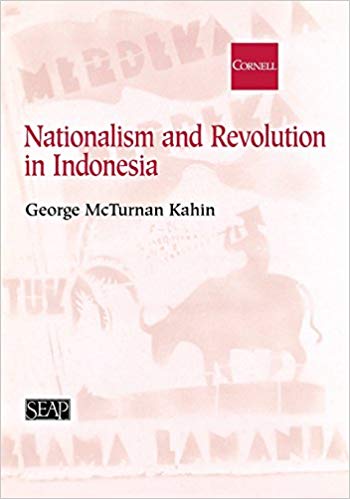
(An immediate, vibrant portrait of a nation in the age of ...)
An immediate, vibrant portrait of a nation in the age of revolution, featuring interviews with many of the chief players.
https://www.amazon.com/Nationalism-Revolution-Indonesia-Studies-Southeast/dp/0877277346/?tag=2022091-20
1952
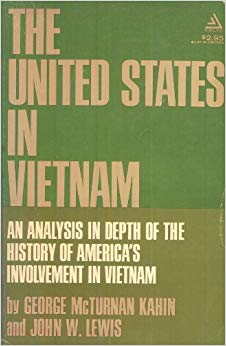
(So much has been written from so many points of view abou...)
So much has been written from so many points of view about the involvement of the United States in Vietnam that the entire issue has become obscured and the truth is difficult, if not impossible, for the general public to discern. This is an objective and historically oriented account of the Vietnamese debacle, fully documented and supported by facts compiled by two of America's foremost scholars in Asian affairs. After a thorough survey of the history of this proud and fiercely nationalistic country, the authors devote the major portion of their book to developments in Vietnam following the withdrawal of the French in 1954. Step by inevitable step the US was drawn into the untenable position in which the nation found itself at the time of this book's writing. It was a position that was remarkably similar to that occupied by the French in the early 1950's. In their illuminating and scholarly analysis of the situation, the authors offer their conclusions that American policy more often than not, ran counter to the realistic possibilities of success and, indeed to the desirable ends of peace and Vietnamese self-realization. Can we study the lessons learned in the Vietnam conflict and apply them to today's geopolitical situations?
https://www.amazon.com/United-States-Vietnam-George-McTurnan/dp/B004AZSC7Y
1967
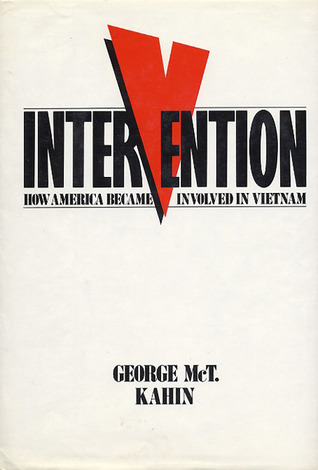
(This book traces the roots of American involvement in Vie...)
This book traces the roots of American involvement in Vietnam and offers a provocative portrayal of Lydon Johnson's role in the Vietnam War.
https://www.amazon.com/Intervention-America-Became-Involved-Vietnam/dp/039454367X/?tag=2022091-20
1986
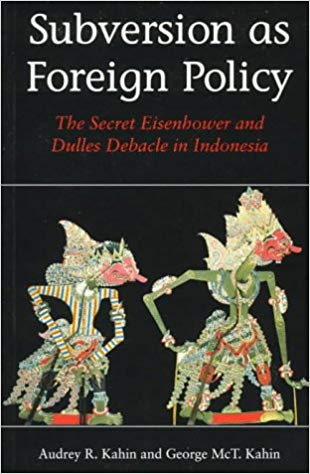
(Based on access to secret documents and interviews with m...)
Based on access to secret documents and interviews with many of the participants, Subversion as Foreign Policy is an extraordinary account of civil war in Indonesia provoked by President Eisenhower and Secretary of State John Foster Dulles, and resulting in the killing of thousands of Indonesians and the destruction of much of the country's air force and navy.
https://www.amazon.com/Subversion-Foreign-Policy-Eisenhower-Indonesia/dp/0295976187/?tag=2022091-20
1995
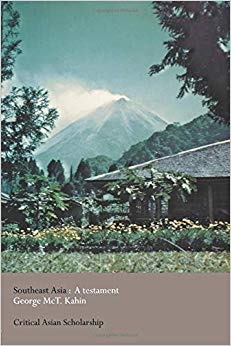
(Southeast Asia: A Testament covers the tragic history of ...)
Southeast Asia: A Testament covers the tragic history of post war Indonesia from its successful struggle against the Dutch to Suharto's bloody overthrow of Sukarno in 1965. It also gives a personal account of the US involvement in Indochina, where George Kahin was an early critic of the Vietnam war and struggled to open the eyes of policy makers to the historical, political and military realities of the Vietnamese situation. Kahin also witnessed the reluctant involvement of Cambodia in the conflict, and the 1970 coup against Prince Sihanouk which paved the way for the Communist accession to power. This book will be of interest to students of American diplomatic and foreign policy, Asian studies, and international relations. It is an engagingly written, often poignant personal account of George Kahin's experiences in Southeast Asia, ad as such will also appeal to the general reader.
https://www.amazon.com/Southeast-Asia-Testament-Transformations-Scholarship/dp/0415299764/?tag=2022091-20
2003
educator historian scientist author
George McTurnan Kahin was born on January 25, 1918 in Baltimore, Maryland, United States. He was a son of George Stanley and Helen Agnew (Andrews) Kahin. He had a sister and grew up in Seattle.
George McTurnan Kahin gained a Bachelor of Science in history from Harvard University in 1940, a Master of Arts degree from Stanford University in 1946 and a Doctor of Philosophy degree in political science from Johns Hopkins University in 1951.
George McTurnan Kahin came to Cornell University in 1951 as an assistant professor of government and executive director of the newly formed Southeast Asia Program. He threw his energies into developing the program throughout the 1950s and served as its director from 1961 to 1970. He also founded the Cornell Modern Indonesia Project in 1954 and directed it until his retirement in 1988. He became associate professor of government in 1954 and full professor in 1959 and was appointed Aaron L. Binenkorb Professor in International Studies in 1968.
Outside Cornell, Kahin served on the faculty of the Salzburg Seminar (1956) and as Fulbright professor at London University (1962-1963), visiting professor at Monash University in Melbourne, Australia, (1971) and visiting fellow at the Center for the Study of Democratic Institutions in Santa Barbara, California (1971-1972). He was a president of the Association for Asian Studies from 1973 to 1974.
George McTurnan Kahin was best known for the 1967 book he wrote with John W. Lewis titled The United States in Vietnam. In 1991 the Fulbright Southeast Asia Regional Research Award was bestowed upon him. In 1992 Cornell University's George McT. Kahin Center for Advanced Research on Southeast Asia was dedicated in his honor. Kahin was a major influence on the foreign policy thinking of Sandy Berger, United States National Security Advisor under President Bill Clinton.
(Based on access to secret documents and interviews with m...)
1995(So much has been written from so many points of view abou...)
1967(Southeast Asia: A Testament covers the tragic history of ...)
2003(This book traces the roots of American involvement in Vie...)
1986(An immediate, vibrant portrait of a nation in the age of ...)
1952George McTurnan Kahin was strongly opposed to United States policy in Vietnam and lectured in numerous forums throughout the country. In April 1965, he was the major speaker against the war at the first National Teach-in held in Washington, D.C.
George McTurnan Kahin was a member of the Council on Foreign Relations and the American Academy of Arts and Sciences.
On July 4, 1942 George McTurnan Kahin married Margaret Baker. Later, they divorced. On March 8, 1967 he married Audrey Richey. They had two children: Brian, Sharon.
